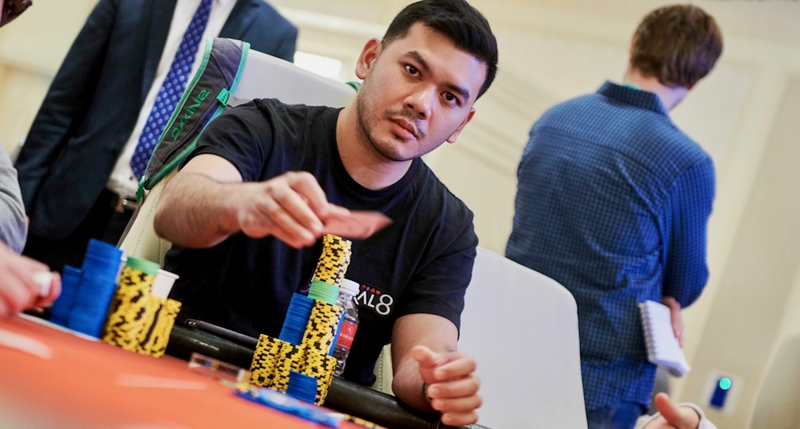






High Stakes Poker Pro Michael Soyza Gives His Thoughts On Short DeckThe Malaysian Pro With More Than $8.4 Million In Discusses The Increasingly Popular Format |
|
|

Short-deck poker exploded onto the high-stakes Asian cash games a few years ago, and since then has grown to the point that the first World Series of Poker bracelet was awarded in the discipline in 2019.
The game is similar to ‘full-deck’ no-limit hold’em in many respects, but the main difference lies in the fact that instead of 52 cards, this game is played with a 36-card deck. The deuces through fives of each suit removed, and as a result of these cards being omitted, there are a few rule changes. In this format, a flush beat full houses, and an ace can play both as the highest-ranked card and as the lowest (a five) in order to complete a nine-high straight (A-6-7-8-9).
While the majority of Michael Soyza’s more than $8.4 million in career live tournament earnings have come in traditional no-limit hold’em, the 30-year-old Malaysian poker pro has been participating in more high stakes short deck tournaments in recent years. He has already cashed for $861,780 playing short deck in the early months of 2020 alone, including finishing runner-up to Phil Ivey in a $50,000 buy-in short deck event held at the partypoker MILLIONS Super High Roller Sochi series for $561,780.
Card Player recently spoke to Soyza for a featured interview that will be released in an upcoming magazine issue. Below is a section of that interview that covers Soyza’s thoughts on short deck, his advice for new players looking to improve their short-deck skills, and more.
CardPlayer: Short deck got really big a few years ago, especially at the highest buy-in levels. It hasn’t quite gotten as popular at lower stakes the way it has at the very highest stakes yet, though. What are your thoughts on this newer game and how to go about becoming proficient?

Michael Soyza after winning a high roller event at EPT Barcelona
If you want to play the game seriously, I would recommend working on equity calculations and trying to construct different ranges, on what you can get in and what you can’t get it on the flop, turn, and river, et cetera. It takes time, but if you work on that, you should be alright.
Up until recently, I never really was able to play the game deep-stacked, especially not in a tournament. If you don’t build a stack, you get short pretty quick, and you end up just flipping. And variance hadn’t been on my side in the past in regards to building a big stack, but this most recent series I had the pleasure of playing deep-stacked short deck in the mid to late stages of the tournament, and it was way more fun than when you are forced to play a bit shorter. Before this point, I had thought it was just a bunch of flips, but once you get to play deep, it’s a whole different game and I really enjoyed it.
CP: What kind of general advice would you give to a player, who was just playing with their friends and wants to have short deck in their next home game?
MS: Just that you can never make too big a mistake in short deck, given that you’re always pretty close behind.
CP: Does the fact that hand equities run a lot closer make it harder to put opponents on a range of hands preflop in certain situations? In no-limit, if you three-bet and get shoved on, you can construct a fairly accurate range against most opponents. Can something like that be trickier to do in short deck, given that the preflop hands are so much closer in equity? (Authors note: For some examples of how preflop equities run closer: A-K offsuit is a true coinflip against J-10 suited preflop in short deck, and is only a 54 percent favorite against 9-8 suited).
MS: Very much so, actually. In fact, the equities for hands in short deck are very different compared to no-limit as a result of the removed cards. Straights are more likely to happen, which transforms the value of suited connectors and middling hands like J-10, 10-9, and makes them more valuable. The way you construct your ranges will be different. Unlike in no-limit hold’em, high card value is not really a thing. You just want connectedness and equity pretty much. It’s more equity-based then frequency-based, more like pot-limit Omaha. So yeah, how you construct ranges for your opponents definitely changes.
CP: In no-limit, a player is often asking themselves if they’re likely to have the best hand on that particular street. Would it be fair to say that in short deck, one should be more concerned with if whether or not their hand is likely enough to be the best by the river?
MS: Exactly. It is exactly like that.
Below is a look at the biggest payouts awarded in short deck tournaments around the world so far:
| Event | Entries | Champion | Top Prize (USD) |
| 2018 Triton Super High Roller Montenegro $1,000,000 HKD (~$128,000 USD) Short Deck | 103 | Jason Koon | $3,653,260 |
| 2019 Triton Poker Super High Roller Series London £100,000 ($125,900 USD) Short Deck | 108 | Justin Bonomo | $3,257,400 |
| 2019 Triton Super High Roller Montenegro $1,000,000 HKD (~$127,500 USD) Short Deck | 98 | Rui Cao | $3,419,000 |
| 2019 Triton Super High Roller Jeju $1,000,000 HKD (~$127,400 USD) Short Deck | 81 | Jason Koon | $2,899,000 |
| 2018 Triton Super High Roller Jeju $1,000,000 HKD (~$127,400 USD) Short Deck | 60 | Kenneth Kee | $2,925,000 |
Photo credits: Neil Stoddart, Manuel Kovsca /Rational Intellectual Holdings Ltd.
